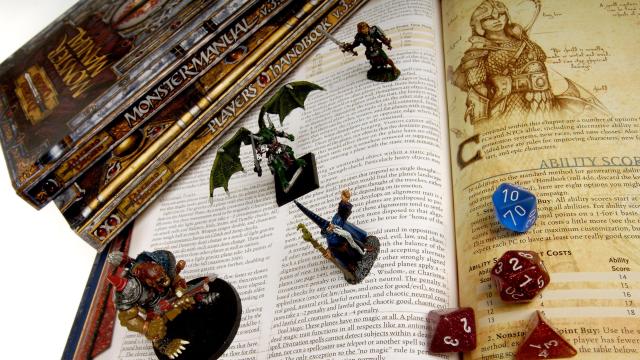Ben Riggs is a D&D historian and author of the book Slaying the Dragon: A Secret History of Dungeons & Dragons.
The OGL debacle appears to be over, but we are left with many questions about the events of the past two months. I have been trying to find the answers to these questions, and have interviewed upwards of a dozen individuals. I have spoken to Wizards of the Coast employees, third party publishers, lawyers, gamers, and fellow journalists, many of whom only agreed to speak under confidentiality given that many signed NDAs, or are Wizards employees. And I think I have some answers.
One of the most important questions may be why Wizards tried to cancel the Open Gaming Licence. The revised text of the now dead as a dodo OGL 1.1 has an answer for us: money. The text reads:
“…moving forward, hugely successful businesses that generate more than $US750,000 ($1,041,150) of annual revenue will also need to share some of that success with us by paying a royalty of 20 to 25% of the “qualifying revenue” they make in excess of $US750,000 ($1,041,150).”
I stick upon the use of the word “share” in that passage. Yes, sharing and paying are both acts of giving, but the difference between the two? It is all the difference in the world.
A confidential source within Wizards told me that making money was the intention behind the OGL revision. They reported the company wanted to receive money from the profits of huge 5E Kickstarters and successful 3rd party publishers.
Money is a comprehensible motivation for the Hasbro-owned company. The Open Gaming Licence 1.0a was a gift to the D&D and TTRPG communities. It is a revolutionary document in the history of TTRPGs. The golden age of TTRPGs that we’ve been living through is in many ways a product of the OGL.
However, one could argue that while the OGL was great for the community and industry, it was not good for Wizards. It is easy for maths-minded bean counters to see every dollar spent on a 3rd party product as a dollar lost to Wizards. (I disagree with that interpretation, but it’s easy to see the argument.) Heck, Wizards tried to kill of the OGL once before with 4th edition and its Game System Licence.
But “Wizards wanted to make more money,” is not the answer D&D Executive Producer Kyle Brink is giving on his PR tour of the internet. For example, in his interview with Three Black Halflings on February 7th, Mr. Brink said there were three reasons to revise the OGL: The advent of new technologies (such as NFTs), the creation of hateful content, and large corporations moving into the space. By large corporations, Brink said he meant, “Meta big. Disney big.” Wizards wanted to limit or control those things, and it was impossible under the Open Gaming Licence 1.0a.
Brink followed up with a hypothetical example wherein Facebook/Meta was trying to make a virtual reality D&D space. I emailed Brink to ask if he had any knowledge that Facebook/Meta was attempting to do such a thing, and he said it was a concern, but the changes in OGL 1.1 were “future-proofing, not reactive.” I also contacted Meta to ask if it had plans to do such a thing, but have not heard back as of this writing.
But in summary, Brink said that Wizards was acting to protect the D&D brand, and to some extent the community, in its revision of the OGL.
So what should we believe? Was the OGL revision a misguided attempt to do good or an attempt to make money?
First, it is hard to take the claims about NFTs and hateful content seriously. Hasbro already sells Power Ranger NFTs, and while the OGL 1.0a does allow hateful people to produce hateful content that you could hatefully use at a table while gaming, they can’t call it D&D. The name is protected by trademark.
Furthermore, a confidential source within Wizards said that concern about Facebook/Meta was not a primary driver behind the OGL decision. Also, the royalty scheme within OGL 1.1 makes no sense if you’re worrying about competition from Meta. The OGL 1.1 said that if you made 5th edition content under its terms, you had to pay a 25% royalty on gross profits over $US750,000 ($1,041,150). Meta is a $US572 ($794) billion company. They can manage a 25% royalty.
In an email with me, Brink conceded the point. But went on to write:
“No multi-billion-dollar corporation is going to want to pay a royalty without negotiating first. Could they afford it? Sure. Would they want to? No. They would probably approach us for a better deal. And that was the point: to encourage the biggest players to work with us as direct licensees, so that we would have a say in their products and services that affected the community and the D&D play experience.”
So according to Mr. Brink, OGL 1.1 was an attempt to gain leverage over others making them into direct licensees.
If that’s true, then this wasn’t about NFTs, Nazis, Meta or money. It was about power.
Brink did go on to add that this was a mistake. He wrote to me in an email, “We were wrong in our assessment of the damage the royalty structure would have on the D&D publishing industry[,]” and added, “We never wanted to damage the D&D publishing ecosystem, and that is why we dropped this entire provision in response to feedback. We were wrong.”

Leave a Reply